Causes of weak hot water pressure from the gas water heater and what to do?
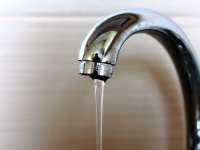
Gas water heater is a convenient (and often the only possible) solution for those who are deprived of the joys of central plumbing and heating. Not everyone is familiar with this device, but those who lived in an older house, connected to the gas supply, know very well what a gas water heater is.
Fortunately, modern gas water heaters, are quite different from those that equipped the houses a few decades ago. Now they are not bulky, noisy and foul-smelling "monsters", but very compact and practical devices, which are almost no reminder of their presence in the apartment.
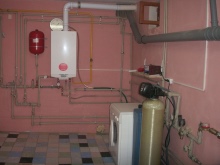
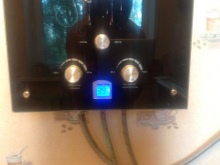
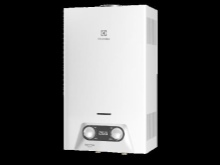
However, some things remain the same. For example, the problem with the water pressure. Modern gas water heaters suffer from this no less than their predecessors. About the causes of low hot water pressure and ways to solve this problem, we will talk in today's article.
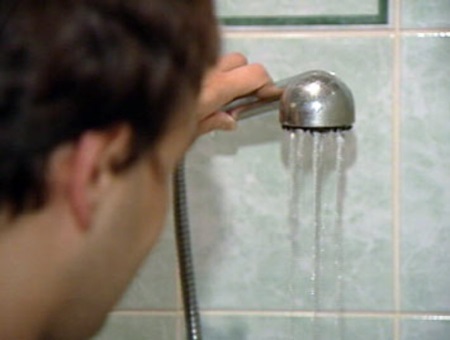
Why is the water pressure not strong enough?
Let's consider the most common factors that affect the water pressure in a flow-through gas water heater.
- The power of the device. In order to have a good water pressure in the gas water heater, you need to buy a device of appropriate capacity. A gas water heater with a capacity of less than 8 kW can give poor water flow. It is better to buy a water heater, the power of which is from 8 to 10 kV.
- Presence of clogs. Any pipes through which water flows are prone to the formation of clogs. If we are talking about a gas water heater, the problem is most often in the strainer, which is clogged with particles of lime and rust. If the water passes through the filter poorly, then the pressure will be small.
- Scale formation. Scale often appears in metal vessels designed to boil water. In a gas water heater, the function of such a vessel, or tank performs the heat exchanger. If the tap water is too hard, over time, a layer of scale forms on the walls of the heat exchanger, which gradually creeps into the tubes - hence the weakening of hot water pressure.
- Consequences of maintenance work. This factor is related to scale, which settles inside the heat exchanger. When the water in the pipes is shut off and then resumed, a so-called "water hammer" occurs, as a result of which particles of scale get into the mixer. As a consequence, a clog will form in one part of the mixer.
- Preventive maintenance. Like any other gas equipment, the heater needs careful maintenance, one of the important components of which is the regular prevention of the appearance of clogs and other malfunctions. Often the cause of poor water pressure is the neglect of maintenance of the device.
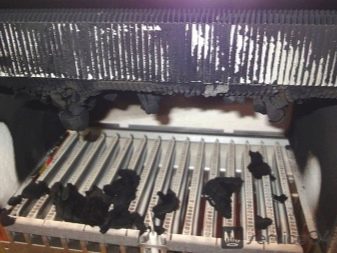
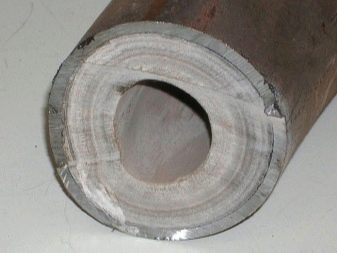
What to do?
|
The Problem |
Ways of solving |
|
The strainer is clogged |
The strainer is located "at the inlet" to the heat exchanger. You can remove the clog by pulling this part out and cleaning it with a stiff brush under running water. If in the process of cleaning you notice that the filter is damaged, replace it with a new one. |
|
Limescale in the heat exchanger |
Special products, which are designed to remove and prevent scale formation in gas water heaters, are not recommended to use. They have an aggressive chemical composition, destroying the metal surfaces. Much more effective and safe "folk" means, such as simple citric acid dissolved in hot water. |
|
Clogged pipes. |
If a clog has formed in the pipe through which the hot water flows, you can try to remove it by running the reverse course of cold water. To do this, you need to remove the plug, put a container under the speaker to collect water and open both taps. Then squeeze the spout with your finger. There is a chance that the cold water, moving in the opposite direction, will push the clog forward. |
|
Faucet Failure |
If small debris has penetrated further than the pipes of the gas water heater, it may well get inside the faucet. The filter, crans-box, and thin rubber hose are the most susceptible to clogging. The problem can be solved by disassembling the faucet and visually inspecting each part for foreign objects. Dirt accumulation is usually easily washed with running water. |
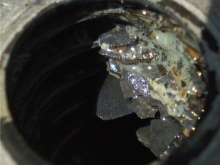
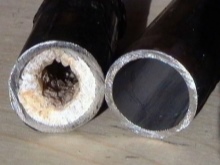
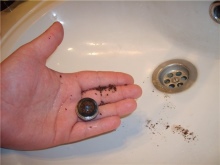
Which gas water heaters work at a low head?
If the reason for a small head of hot water is not in the gas equipment, but in the water pipes, you can solve the problem by either normalizing the pressure in the pipes, or buying a gas water heater, which will function properly even with a poor head of water.
With this task will cope with modern gas water heaters, which are equipped with a device for adjusting the water pressure. They operate on the following principle: the stronger the water head, the higher its temperature, and vice versa. Thus, if you set a minimum temperature of water, the water heater will turn on even at a low head. However, if you constantly have problems with the head of hot water, it is advisable to equip the system with a pump.
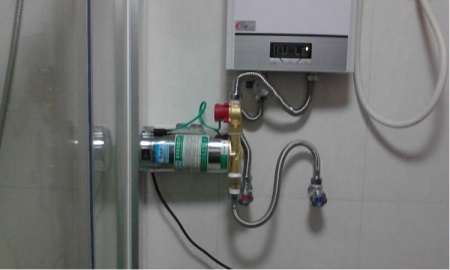
To wash the heat exchanger from the scale on your own you can watch the following video of the user Youtube, in which everything is explained and described in detail.




